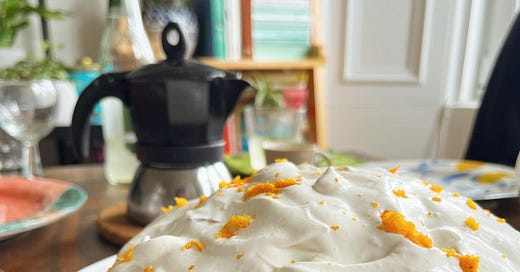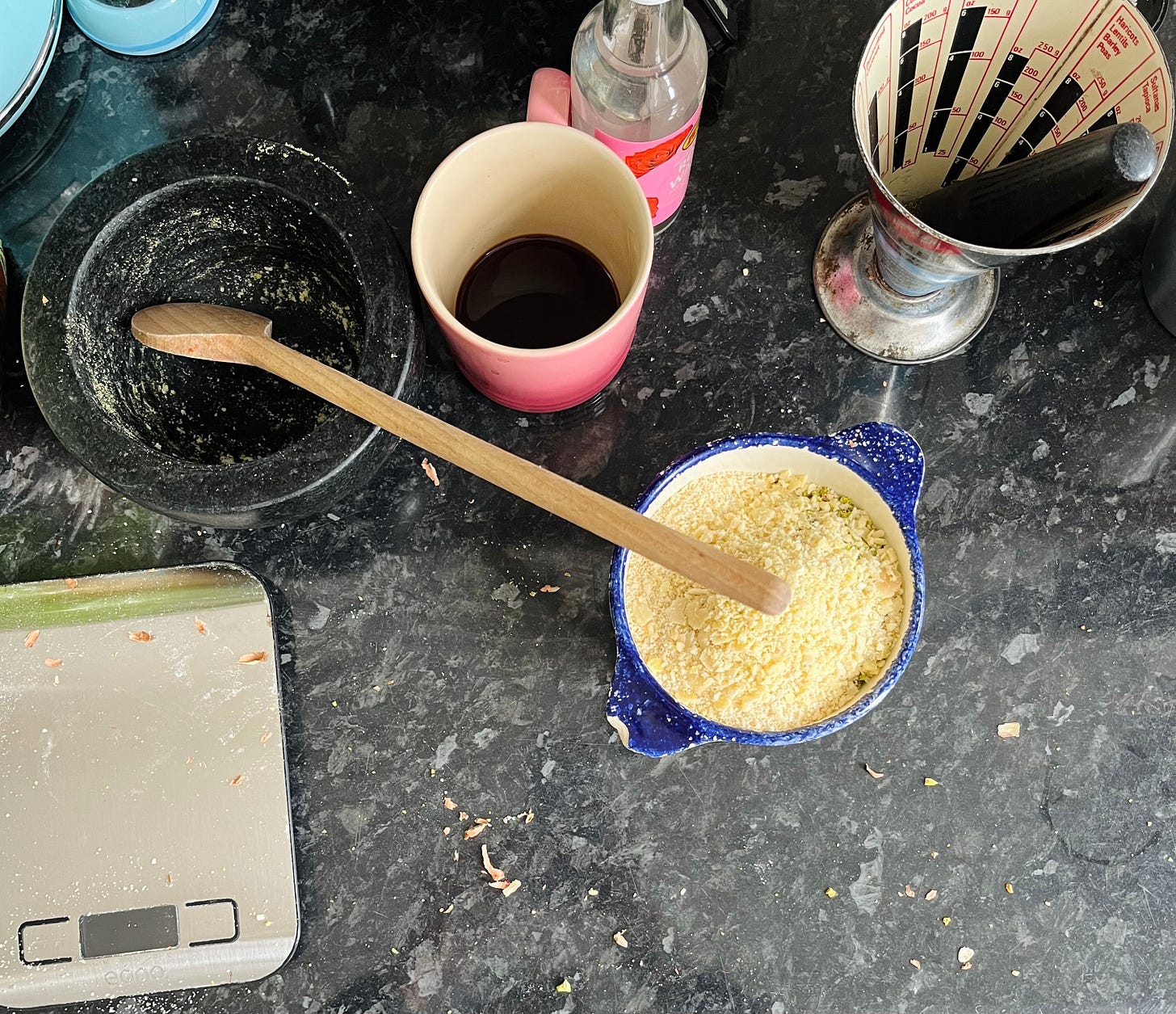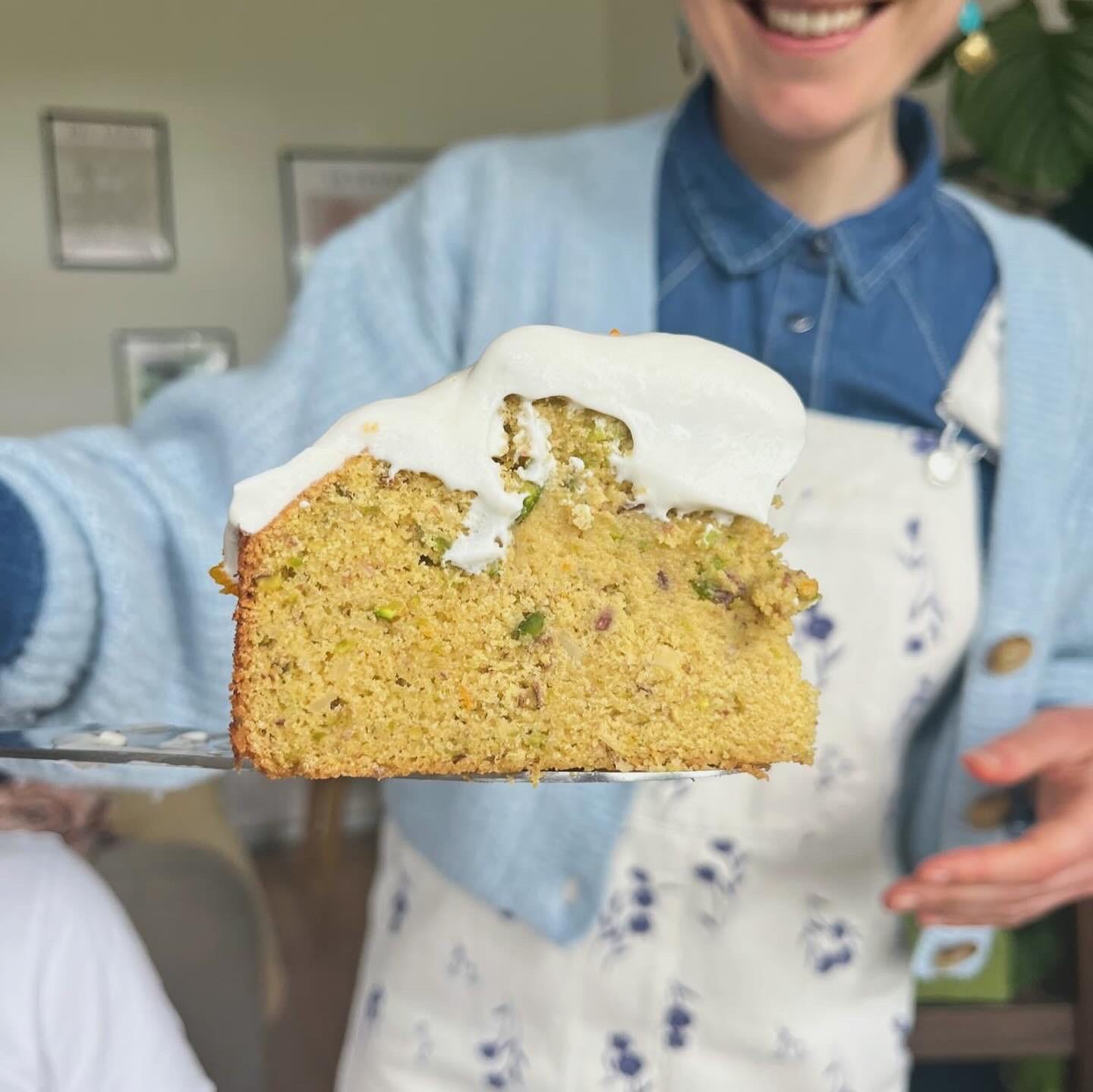#22: pistachio and orange polenta cake, rose whipped cream
some thoughts about muscle memory and a cake recipe
When I step into the kitchen, we’re approaching 11am. I have three hours before our guests are due to arrive for a pasta-making session, which means I have three hours ahead of me and no meal to cook. We will do that together. I tuck coffee in the moka, put it on the hob and grab one of the notebooks I keep at the end of the counter, where I scribble recipes as I cook. They are battered but I cherish them.
Our living room here in Scotland overlooks a playground. The weather seems irrelevant to this place – whether it’s raining or snowing or windy or, surprise, sunny, there are kids and dogs buzzing around. It’s noisy, in a lively manner, and this is one of the things I love the most about our current flat. I often make a point to stand by the window with my coffee, so I can watch over the park. Sometimes I pour the drink into a travel mug, so I can sip it sitting on one of the benches next to the playground. But not today: this morning I’m tired from chronic pains riding through my body, hearing the kids shout outside, so I’m going through my recipe notebook instead, in an effort to make it make sense.
I wrote about cooking for my three-year-old niece before, Louise, and how the experience forced me to delay making decisions. That was, to pause and to reassess the steps towards completing tasks I had done routinely before, so I could include Louise, for whom everything was new and thus incohesive. Keep in mind that I have known few children in my life and rarely spend time with them, so the following observation might sound either inaccurate or obvious to some of you, but I have concluded that children have no muscle memory. I cast my eyes on them, floating around the playground as if they were space invaders into this world and societies, disarticulated bodies and speedy tongues, picking a fight before giving each other a peck. The boundary between what is known and unknown is thin and malleable, and I love this for them.
The idea that being a functional adult is to have acquired an effective muscle memory for our domestic life and everyday gestures, as well as our social interactions and our jobs has been troubling me lately. I’m learning to drive and my instructor always reminds me that it will become easier when I will be doing half of the stuff without thinking, thanks to muscle memory. Runner friends are obsessed with the concept when they tell me about their rigorous training programme. We say to writers: exercise that muscle by writing every day. In an ableist society, we keep saying do, keep going, setting unreal expectations by not recognising that a system brings limitations in that it excludes anything and anyone that could contest it to perdure. I’m not arguing that muscle memory makes change impossible, but that the idea that linear perseverance is a good show of strength makes it harder to believe that something familiar could be done differently. A physician would tell you to rest and hydrate that muscle so you can keep building it safely, otherwise a sore muscle will come back to haunt you.
In the kitchen, I can smell the coffee before hearing the echo of its boiling. A curse; ‘café bouillu, café foutu,’ boiled coffee, spoiled coffee, as my mum would say – and, just like that, a taste of bitter coffee paired with the realisation that I haven’t baked something sweet in months. In fact, there isn’t one cake referenced inside my current recipes notebook. Yet, to develop a recipe for a cake and dedicate it to someone has always been my thing in the kitchen. Not necessarily my favourite kind of food, but the mind healer I resort to the most because it always shakes me up. It demands me to think about the chemicals behind baking as I make decisions about components such as butter, eggs and flour, to imagine what the person for whom I bake might like and what combinations might surprise them; it requires me to be patient and to be focused; I must take risks, otherwise I would be baking the same cake again.
There is no muscle memory involved in looking attentively. Regardless of how one looks, by ear or by sight or by touch, in any manner someone decides to inhale the world around them, that idea will change by the second because, soon enough, there will be someone looking at you looking at them.
With writers, in fairness, I don’t speak about muscle memory. I don’t think practice or applied prose is more important than thinking, than finding a connection between the ideas that interest the writer and the voice the author holds to tell the story. Consistency, to that end and in my opinion, is a false friend in that it proscribes free crafting and fluidity. To writers, I say read and think. And like anyone who gives advice, I often need reminding about my own advice, so a good friend did that and gifted me a book I had been waiting to read for a long time. A treat, which I gulped.
‘When they came to the steps that led to the cliff, she found her sandals. He helped her climb the loose sand to the first step. As he took her hand, he thought this might have been what he came down here for, to touch her once, to have her smile as she leaned on him. And then to walk slowly behind up to the edge of the cliff.’
— Long Island by Colm Tóibín
In the kitchen, turns out the answer is as evident as cooking. The kitchen as a space is daunting – messy, inflammable, loud – until it’s filled with a cooking purpose. More than a muscle memory, it’s a sensorial experience that takes place in the kitchen – a constant link between past and present, and an enabler for the future. Pages are crowded with words until we read them carefully enough to allow the author to build a scene around us, and to be welcomed into their vision of the world. Just like the kids in the playground below the house, it isn’t about how pretty and tidy it is but about the constant negotiation between what we thought was true and what might not be so true anymore.
So I added a splash of hot water to my coffee, loosening its bitter aftertaste, and I shelled and crushed pistachio nuts.
This one is for Steffi and Kev. Recipe for pistachio and orange polenta cake, served with a rose whipped cream:
for the cake
100g pistachio, shelled and ground
80g ground almond
zest and juice of 1 orange
1 tbsp rose water
280g polenta (fine, not instant)
2 tbsps baking powder
1 tsp salt
150g brown sugar
150ml almond milk, unsweetened
3 eggs
Preheat the oven to 180C.
In a large bowl, mix the pistachio, ground almond, polenta, baking powder, brown sugar and the orange zest.
In a separate bowl, beat the eggs with a pinch of salt. Add the almond milk, the rose water and the orange juice. Mix well. Incorporate the liquid preparation into the dry ingredients, mixing continuously and until you’ve a homogeneous preparation.
Pour the preparation into an oven dish. Bake for 35 minutes, or until the cake is golden and cooked throughout. Leave it aside to cool.
for the whipped cream
125ml wipeable oat cream (I use this one)
1 tbsp rose water
zest of 1 orange
In a large bowl, (electric) whisk the oat cream and the rose water until you’ll obtain a whipped cream with the consistency of your choice. Dress the cake with the whipped cream and sprinkle the orange zest on top.
Eating note: I didn’t have enough ground almond but, ideally, I would have wanted more ground almond and less polenta. You’ll have to tell me how it goes for you if you ever try this one.
Margaux
PS. If you enjoy this newsletter, feel free to forward it to a friend, or two.
Thank you for reading The Onion Papers. If you enjoy my words, you can support what I do by upgrading to a paid subscription. You’ll get access to the full archive and Monday entries. It costs £4 per month, or £40 a year, and you can unsubscribe at any time. No pressure: I’m happy you’re here either way.
The Silence Within
On 13th May 2024, short story writer and 2013 Nobel Prize for Literature winner, Alice Munro, died in Port Hope, Canada. Munro is the first author I remember reading in the English language. It was 2014 and I was at the library on the campus of the Université de Montréal – and I panicked. I was highlighting words, reading the same paragraph over and aga…










